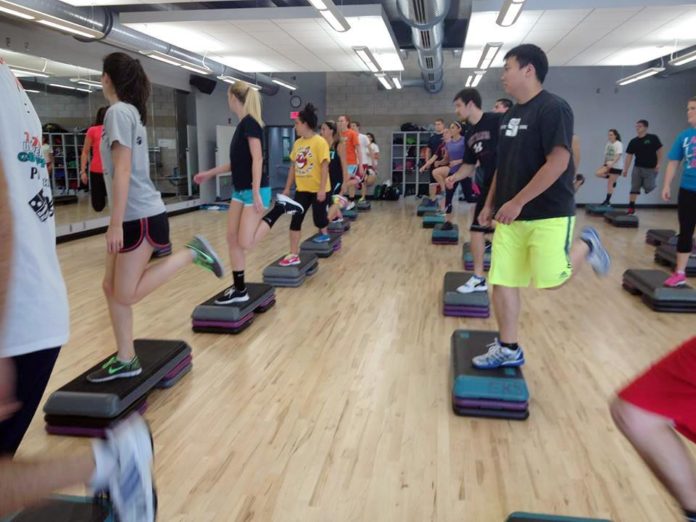In honor of American Heart Health Month, Slippery Rock University is taking steps towards healthier living and overall wellness this February with programs that focus on getting people active to combat the greatest heart disease risk factor, physical inactivity.
The Center for Disease Control and Prevention (CDC) reports that heart disease is the number one cause of death for both men and women in the United States. In response to this statistic, organizations and departments on campus are striving to engage the students, faculty and community in initiatives that will not only provide health benefits in the short-term future, but also help combat health issues that could arise later.
The CDC found that physical inactivity is the greatest heart disease risk factor, and over 53 percent of American adults report being physically inactive.
Initiatives such as the “Walk the Rock” program, the new Exercise is Medicine program, Run Club, the Rock Personal Training program and fitness classes at the Aebersold Recreation Center (ARC) all provide opportunities to increase physical activity and overall health. The Recreational Therapy program also has a few of its own projects that help stimulate physical activity in people who may have a disability.
“Each of the programs offers the SRU community opportunities to enhance their cardiovascular health, reducing their risk for heart disease,” associate professor of exercise science, Kimberly Smith said. “These are all great ways to enhance physical activity.”
“Walk the Rock” is a pedometer-based system that encourages SRU community members to increase their level of daily physical activity. The program offers incentives to its 261 registered participants throughout the 12-week course, which is in its ninth semester this spring. Smith said that the group hopes to collectively walk over 120 million steps as well as significantly increase the amount of physical activity the participants complete from week one to week 12.
The exercise science program and the health center are collaborating on a new program called “Exercise is Medicine”, which allows the health center staff to add physical activity as their sixth vital sign for all non-emergent visits to the center.
Smith explained that students coming in for evaluation will now be asked about their level of physical activity in addition to having traditional vitals such as blood pressure and heart rate taken. Then, students can be matched with an exercise science intern who will conduct free motivational interviewing, fitness assessments, training sessions and more.
Run Club is another organization on campus that offers fun and free opportunities to simultaneously get involved and get fit. Smith stated that the club is in its eighth year, and although it originally started out as just an exercise science club, over the years it has expanded into a campus-wide organization. Participants walk, jog or run a 5K, 3.1 mile loop around campus, with opportunities to decrease or increase the distance to suit each individual participant.
Freshman early childhood education major Paige Rickey, 18, joined the club last semester.
“Run Club is a lot of fun, it motivates me to go and run when I otherwise wouldn’t want to,” Rickey said. “There are people in the club that run at all different speeds. The group factor plays into it being motivating, and it’s a great way to meet new people. We have themes each week to make it even more exciting. For example, because Valentine’s Day is this weekend, we all decided to wear red and pink for Tuesday’s run. You can also decide to join anytime throughout the semester.”
Smith also commented on the Rock Personal Training program, which offers SRU faculty, staff, students and community members opportunities to engage in one-on-one personal training sessions with a senior exercise science major. Participants receive motivational interviewing, fitness assessments and twice weekly training sessions throughout the semester, for a nominal fee.
In addition to the structured programs on campus, the ARC also offers free classes on activities such as zumba, yoga, spinning and meditation. These group exercises can all help reduce the risk of heart disease.
Dr. Betsey Kemeny, assistant professor in the recreational therapy program in the Parks and Recreation Department explained that her department has been facilitating several service-learning programs to help students integrate classroom learning with hands-on opportunities to help individuals with disabilities fulfill their daily physical activity recommendations.
The TRAILS (Therapeutic Recreation Accessing Independent Leisure and Social Skills) program is based at Storm Harbor Equestrian Center and assists youth with autism spectrum disorders with social and communication skills through sports, recreation, equine-assisted activities and aquatics, all the while helping the participants improve their health and wellness.
“The Storm Harbor Recreational Therapy program is an health-outcomes focused equine-assisted program for veterans and armed services personnel,” Kemeny said. “The ‘I Can Do It’ program is a health promotion for older adults with disabilities in which TR [theraputic recreation] students are applying a nationally recognized physical activity and nutrition program to older adults.”
Slippery Rock’s advancement of their fitness programs is aimed at helping to prepare students, faculty, staff and community members for healthier lives and improved wellness. Programs such as Walk the Rock, Exercise is Medicine, Run Club, the Rock Personal Training program, TRAILS and “I Can Do It” all offer opportunities for everyone to take steps toward reducing heart disease and improving their general health.








